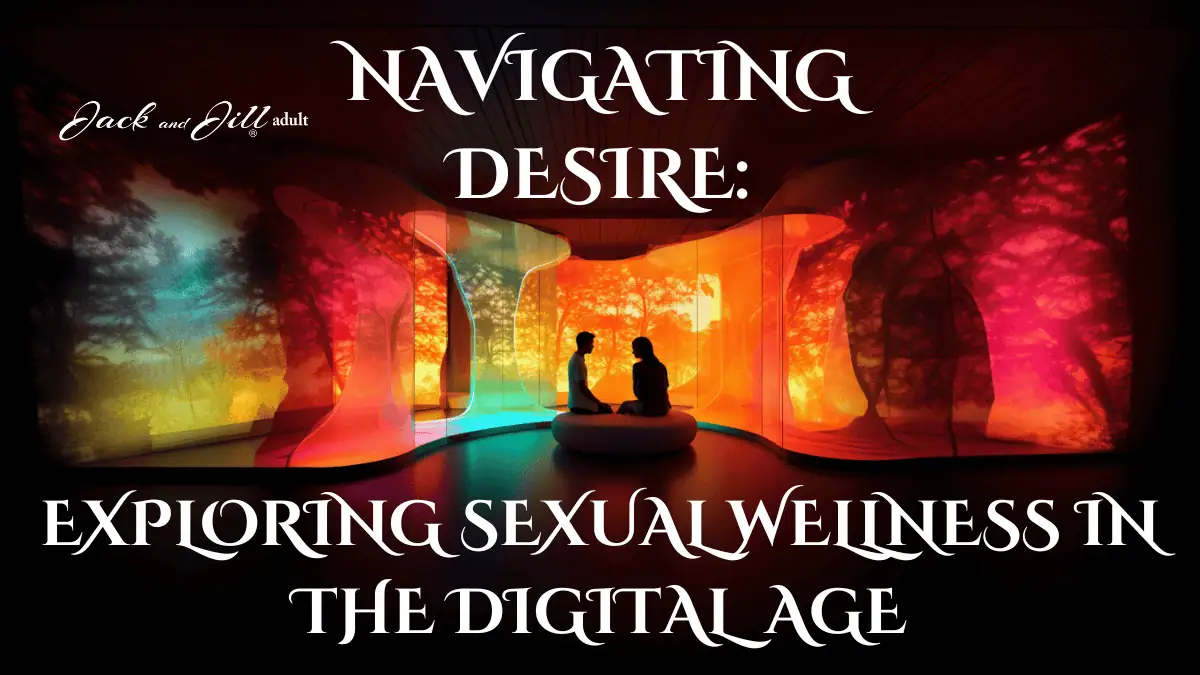
Navigating Desire: Exploring Sexual Wellness in the Digital Age
How is the digital age redefining sexual wellness? This article discusses sexual wellness in the digital age and how the digital era is shaping our views and experiences of sexuality. We examine technology’s role in shaping our sexual experiences, views, and education. We explore digital influences on relationships, consent challenges, and the necessity for safe practices. Get ready to navigate the intricate intersections of sexuality and tech, from the privacy of bedroom screens to the public domains of social media and beyond.
Key Takeaways
- The digital age has significantly influenced the landscape of sexuality, altering how individuals access sexual content, engage in relationships, and explore sexual identity, with widespread implications for sexual wellness and education.
- Advancements in virtual reality, sex robots, and telemedicine represent milestones within sexual wellness, raising ethical, privacy, and access concerns while providing immersive experiences and remote healthcare opportunities.
- Comprehensive sexual health education must evolve to address the complexities of digital consent, online safety, and media literacy, enabling individuals to navigate the risks associated with digital sexual activities and platforms.
The Digital Landscape of Sexuality
With the advent of the digital age, our sexual lives have undergone a seismic shift. Digital technology has permeated every facet of our sexual identities, practices, and experiences. From the burgeoning world of online pornography to the convenience of dating apps and the ubiquity of social media platforms, these digital avenues have given us unprecedented access to sexual content and connections, thereby redefining our perceptions of sex and intimacy.
Online Pornography
Online pornography and forms of online sexual activities have dramatically transformed the sexual landscape. The internet has made sexual content easily accessible, providing a space for quick, non-reflective sexual gratification that can create an illusion of sexual mastery. This phenomenon has been further fueled by the rise of amateur pornography, with its collective production, distribution, and reception model.
The advent of virtual reality (VR) has further revolutionized the world of online pornography. By increasing feelings of intimacy and emotional interaction with performers, VR pornography offers more vivid and immersive experiences.
Emerging technologies, such as teledildonics, are also making waves in the realm of online pornography. These devices, which simulate tactile sexual sensations over distance, are becoming increasingly prevalent, further enhancing the immersive experience of VR pornography.
Dating Apps
Dating apps have significantly altered the dating scene, enabling users to connect with a larger pool of potential partners than traditional dating methods ever allowed. Algorithmically determined compatibility has streamlined the process of finding matches, making dating more efficient. However, this convenience has also led to a culture of swiping and rapid judgment based on minimal information.
Despite the many benefits, dating apps also bring concerns about user safety. These concerns have triggered the development of new features designed to protect users’ privacy and reduce the risk of harmful encounters.
Moreover, the use of dating apps has implications for long-term relationships. Online interactions can sometimes lead to issues of trust and fidelity, highlighting the need for open communication and understanding in the digital age.
Social Media Platforms
While instrumental in connecting people, social media platforms can also introduce feelings of jealousy and mistrust in relationships. Open communication and clear boundaries for online interactions are essential to mitigate such issues.
Moreover, sharing personal moments on social media can blur the boundaries between public and private life. This lack of distinction can strain relationships, emphasizing the need for discretion and respect for privacy in the digital age.
Sexual Health Education in the Digital Age
Sexual health education, including sex education, has evolved to embrace digital context challenges like sexting, moving away from sex-negative approaches. Given the growing prevalence of digital communication forms among teens, this shift is crucial.
It has become increasingly clear that sexual health education must include content on safe and technology-informed practices that consider individual predispositions, which play a crucial role in shaping behaviors such as creating and sharing sexual content.
Media Literacy
Media literacy is a crucial component of comprehensive sexual health education. Programs like ‘Media Aware demonstrate the benefits of media literacy in sexual health education’s ability to evaluate sexual content and improve communication critically.
Comprehensive media literacy education is pivotal in helping young people critically evaluate sexual content online. By fostering critical thinking about media messages, media literacy education can mitigate the negative impacts on sexual health, including the potential for non-consensual sharing of imagery and online sexual harassment.
Consent in Digital Spaces
Digital consent, much like in-person consent, requires explicit and voluntary permission for something to happen or an agreement to do something. However, the complexity of online consent is heightened in digital interactions that often lack non-verbal cues, necessitating tailored educational strategies in sexual health programs.
Forms of non-consensual sexual interactions, including sexual violence, in digital contexts, are:
- Peer pressure
- Extortion
- Deception
- Threat
- Sexual harassment
- Unwanted initiation of sexual interactions via technology
- Violent interactions with technological artifacts
These risks emphasize the need for robust educational strategies that underline both the importance of respect for privacy and the severe consequences of cyberbullying.
Safe Online Practices
Safe online practices are a crucial part of sexual health education in the digital age. To maintain privacy during sexting, recommendations include avoiding faces or identifiable features in sexual images to reduce misuse risks.
Moreover, media literacy education advises individuals to manage sexts cautiously, not forward them, and consider alternatives to nudity in images they send. Ensuring safe online practices also entails respecting others by seeking permission before sharing their information or photos, including clarifying availability for activities like video calls.
The Role of Digital Technology in Sexual Identity Development
Digital technology has played a significant role in sexual identity development, providing new spaces for identity management. While empowering individuals in many ways, it also has the potential to disempower them, particularly sexual and gender minorities who often face online hostility, social exclusion, and discriminatory practices.
Sexual Minorities
The internet plays a significant role in facilitating social networking for individuals of various sexual orientations, helping mitigate feelings of social isolation. Digital platforms have become critical spaces for sexual minorities to find community and support, acting as a vital resource during the process of identity exploration and understanding their sexual orientation.
Online platforms have become instrumental in empowering sexual minorities, including various sexual orientations, by providing spaces that allow for personal growth and greater control over their sexual life. These platforms offer opportunities for engagement and shared experiences, contributing significantly to the self-acceptance of sexual minorities.
Gender Identities
Digital spaces offer an opportunity to:
- Challenge traditional gender norms
- Provide a platform for individuals to question and redefine these norms
- Enable individuals to experiment with and express diverse gender identities beyond the binary framework.
Trans individuals, in particular, leverage digital platforms to affirm their gender identities, navigating potential online abuse and stigma. Digital technology offers them a space to explore their gender identities, find community, and seek support, playing a significant role in their identity development process.
The Intersection of Technology and Intimate Relationships

Lovense Diamo Cock Ring – Black
Digital technology has permeated intimate relationships, influencing everything from communication and trust to sexual satisfaction. This intersection of technology and intimate relationships raises new questions and challenges, requiring us to reassess our understanding of consent, commerce, and sexual satisfaction in the digital context.
Digital Communication
Digital communication tools, such as texting and social media, offer convenience and constant connectivity, enhancing the dynamic of relationships. Technology is integral for couples in long-distance relationships in maintaining communication, providing emotional support, and fostering connection despite geographical barriers.
These tools also offer couples a platform to explore and share their sexual desires and preferences, contributing to a heightened sense of excitement in their intimate lives. However, excessive use of digital communication can lead to an overload of messages and reduced quality of meaningful conversations, presenting challenges within relationships.
Trust in the Digital Age
Online temptations and the easy accessibility of digital interactions present significant challenges to maintaining trust between partners in romantic relationships. 16% of married couples have reported infidelity-related behaviors on social platforms, highlighting how social media can lead to issues such as jealousy and misunderstandings.
About 45% of couples using social media have argued over content posted online, suggesting that online interactions can contribute to the erosion of trust. To counteract the possible adverse effects of digital devices on personal interactions, couples establish ‘tech-free’ zones or times, fostering undistracted, meaningful communication.
On the other hand, receiving an image from someone is often seen as that person sharing vulnerability, which is considered a sign of trustworthiness in the context of online interactions.
Sexual Satisfaction
The introduction of digital technology into intimate relationships has had varied effects on sexual satisfaction. While smartphones and social media can distract from forming emotional connections with a sexual partner, apps specifically designed for couples offer ways to improve intimate connections.
Emerging technologies are transforming sexual practices by introducing the ‘datafication’ of intimacy and sexual pleasure. This digital phenomenon is influencing the ways individuals experience sexual satisfaction, indicating a potential future where data and analytics play a pivotal role in our intimate lives.
The Future of Sexual Wellness in the Digital Age

As we look to the future of sexual wellness in the digital age, advancements in virtual reality and intelligent systems are introducing novel modalities for sexual exploration. However, with the growth of digital sexual mediums, there are considerable privacy concerns and a pressing need for robust cybersecurity measures.
This future also demands policy and educational measures to improve resilience and mental fitness in navigating technological risks, particularly concerning the ethical debates surrounding sex robots and the benefits and limitations of telemedicine.
Virtual Reality
Virtual reality (VR) is poised to bring about a revolution in the realm of sexual experiences. VR pornography provides vivid and immersive sexual experiences that are more intense and exciting compared to traditional 2D pornography. Some benefits of VR pornography include:
- Higher levels of sexual arousal compared to conventional digital pornography
- Enhanced sense of presence and immersion
- Ability to explore different perspectives and scenarios
- Increased engagement and interactivity
It is important to note that the extent of these effects may vary by person.
Avatar sex within immersive virtual environments is described as more disinhibited, diverse, and adventurous, suggesting a possible reshaping of sexual desire and behaviors.
Sex Robots
Sex robots, a type of advanced sex toys, are at the center of ethical debates due to their ability to mimic human touch and provide companionship, challenging our understanding of human relationships, consent, and objectification.
Emerging ethical and legal concerns around sex robots include issues related to the possibility of assault and rape, as well as the broader implications of consent. These debates highlight the need for robust regulations and ethical guidelines to navigate the future of intimacy with sex robots.
Telemedicine
Telemedicine provides a platform for individuals to seek sexual health services and advice remotely, often through video calls, chats, or specialized apps. Its convenience, cost-effectiveness, and privacy make sexual health services more accessible to a broader audience.
However, one limitation of telemedicine in sexual health is that it might offer a less personalized experience than in-person visits. Furthermore, telemedicine requires a certain level of technological access and literacy, which could impede its use, especially among underserved populations.
Summary
In conclusion, the digital age has profoundly transformed our sexual identities, practices, and experiences. From the rise of online pornography and dating apps to the advent of virtual reality and sex robots, technology has reshaped our sexual landscape. However, this transformation brings new challenges – from concerns about consent and privacy to the need for comprehensive sexual health education and media literacy. As we navigate the future of sexual wellness in the digital age, we must continue to promote respectful, safe, and fulfilling sexual experiences for all.
Frequently Asked Questions
How does the Internet influence sexuality and gender?
The Internet influences sexuality and gender by impacting sexual attitudes and identities, gender relations, sexual minorities’ political activism, the inclusion of people with disabilities, the spread of sexually transmitted infections, and sexual satisfaction, as well as predicting sexual attitudes and behaviors of young adults and their frequency of Internet use.
How does the media influence your sexuality?
Research suggests that the media has an impact on sexuality through the portrayal and reinforcement of sexual and relationship norms, as well as the lack of representation of sexually responsible models. It’s essential to be critical of the media’s influence on sexuality.
How has the Internet changed the way people connect, meet, and engage in sexual activities?
The Internet has transformed the way people find partners, with online dating apps allowing for sexual self-disclosure and explicit media consumption. These changes have shifted communication patterns and behaviors surrounding sexual activities.
Why is media literacy critical in sexual health education?
Media literacy is vital in sexual health education because it helps young people critically evaluate sexual content online and navigate digital spaces safely, fostering critical thinking about media messages to mitigate their negative impacts on adolescent sexual health.
How can digital technology affect trust in relationships?
Digital technology, such as social media and dating apps, can create challenges for trust in relationships by introducing online temptations and easily accessible digital interactions. This emphasizes the importance of open communication and understanding in relationships.
